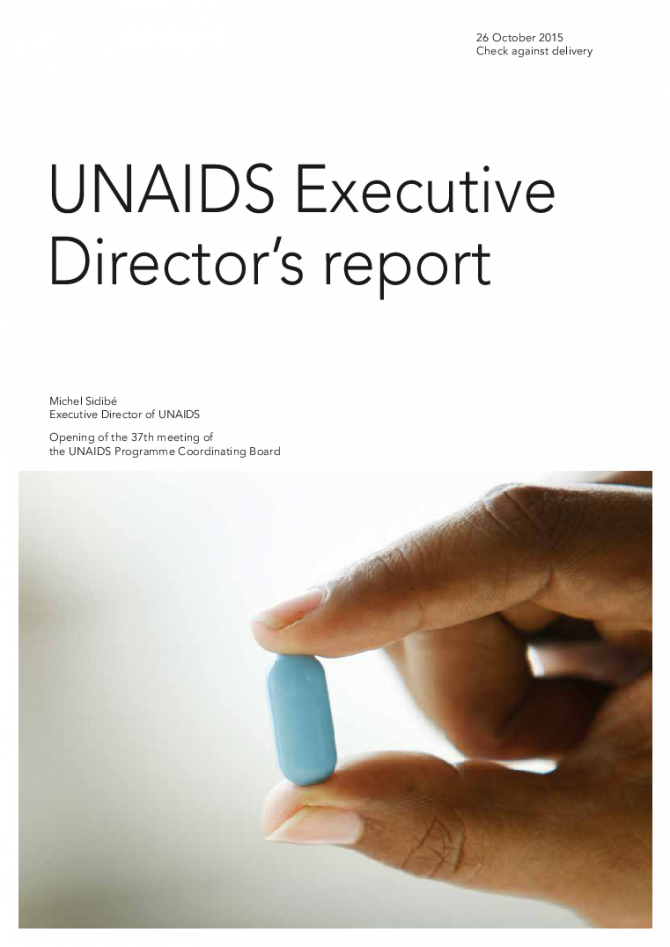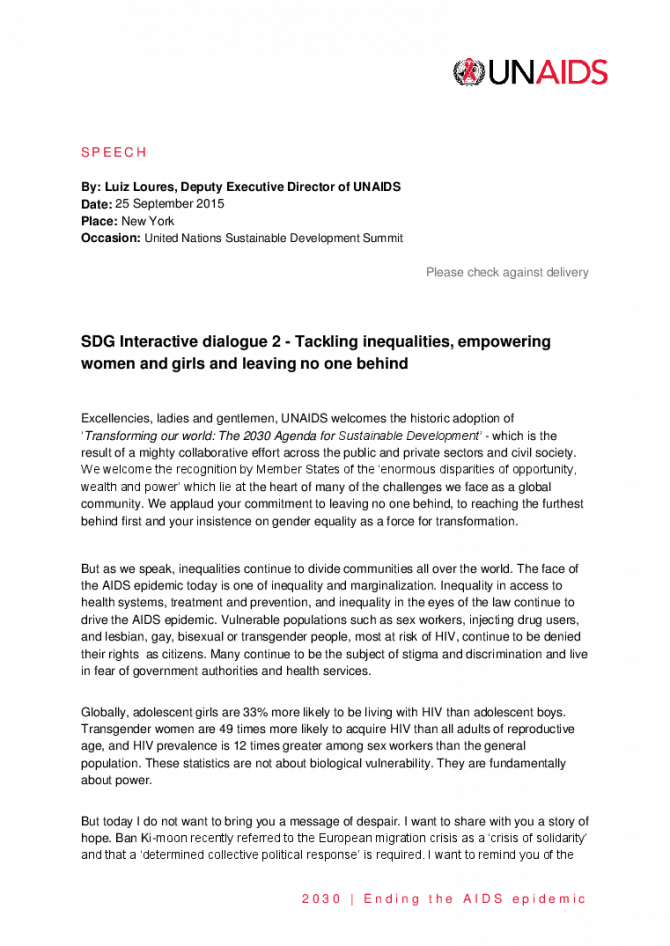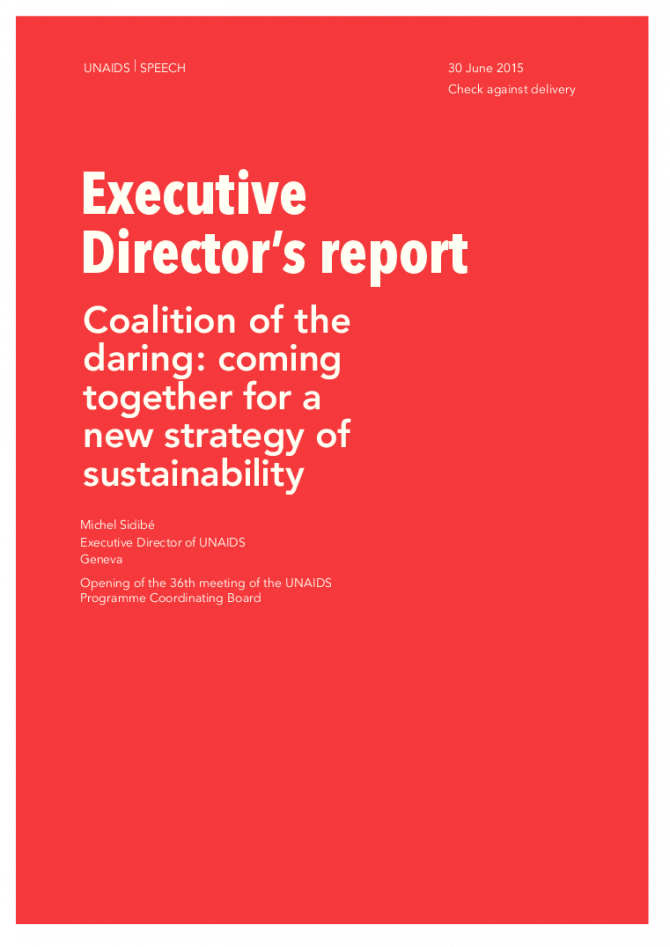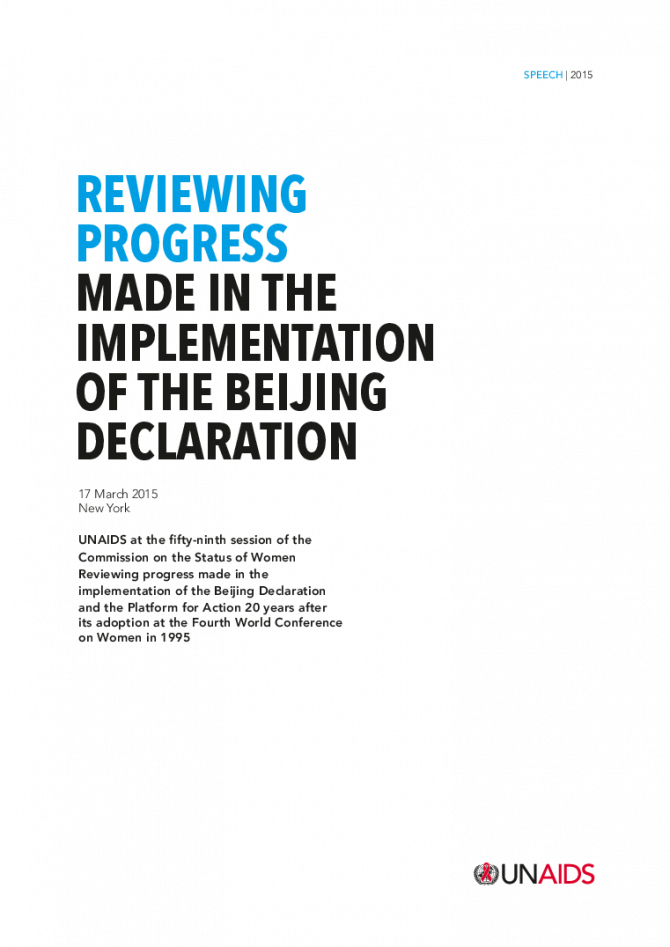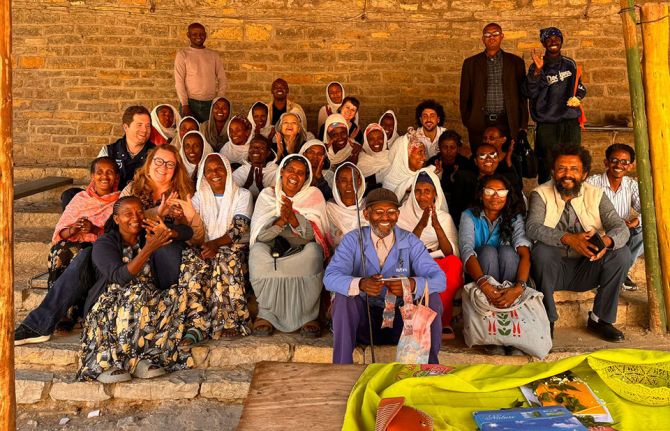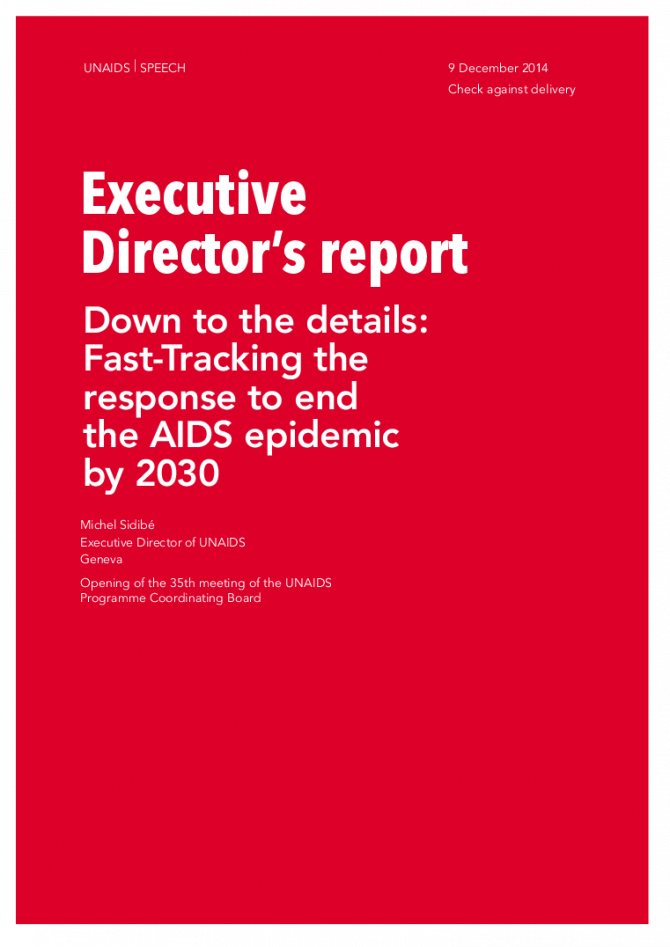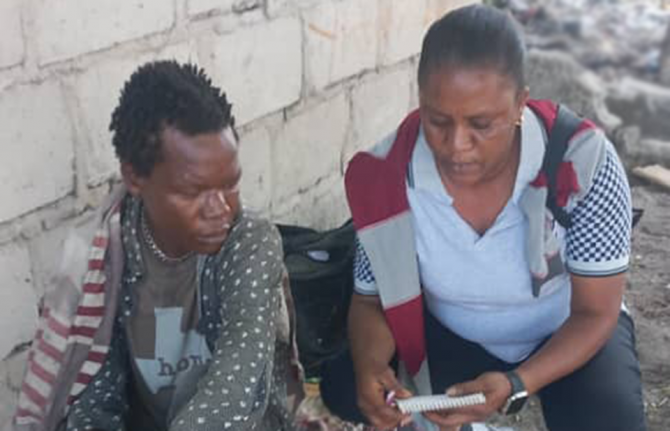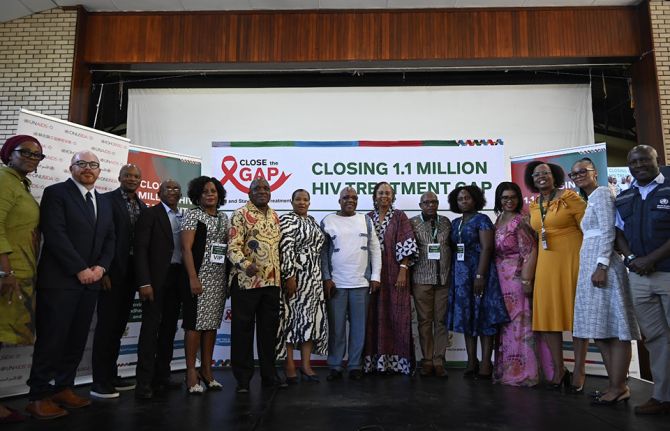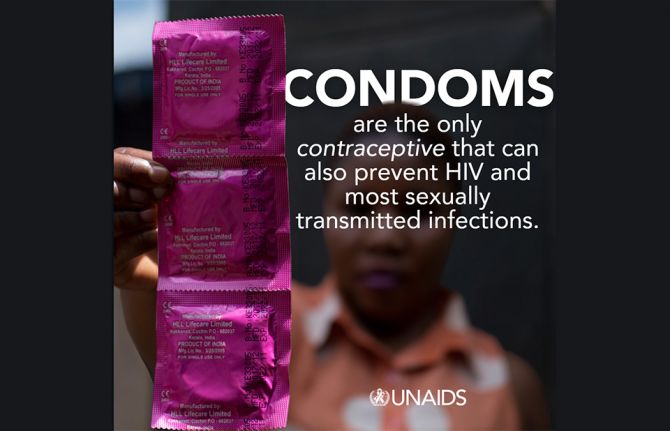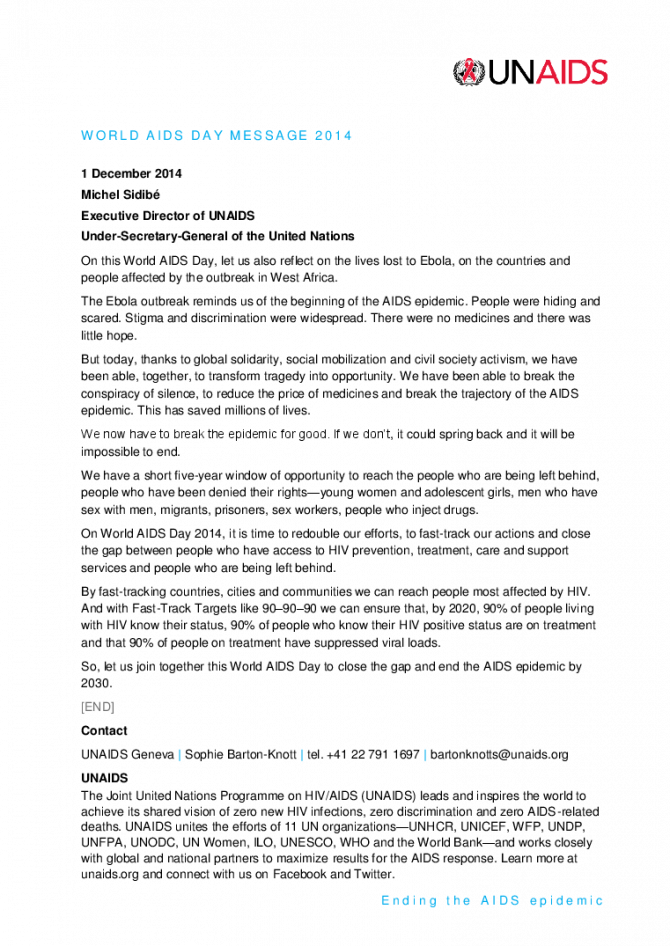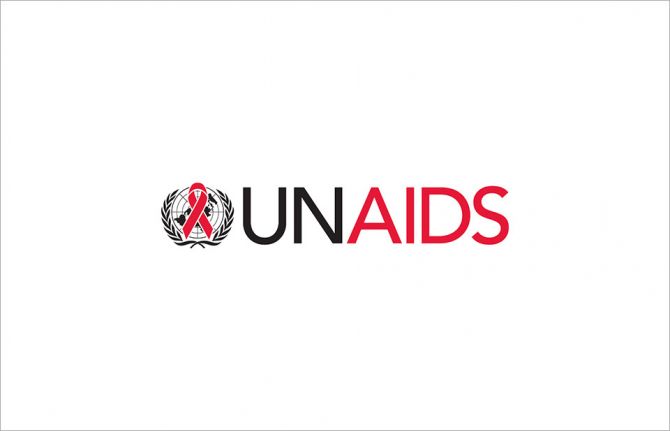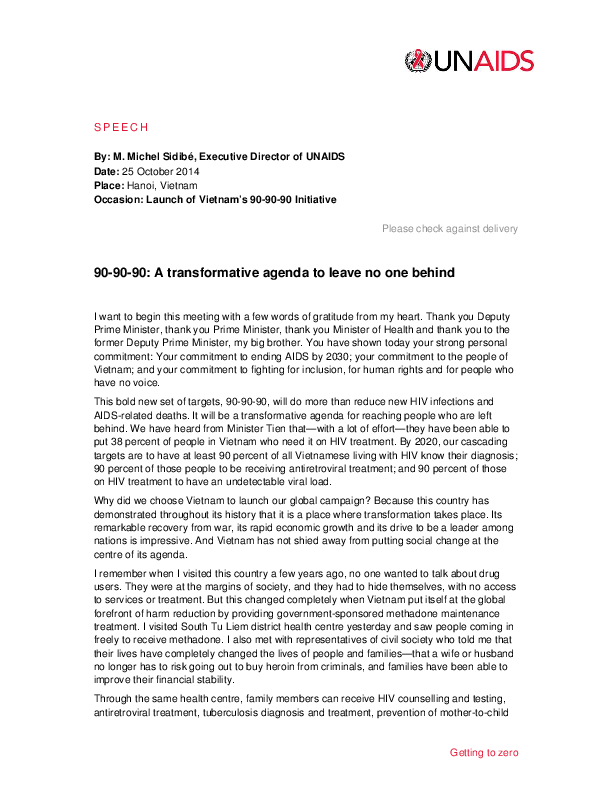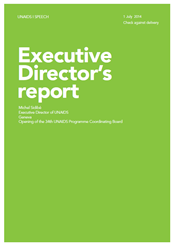Documents
PCB-37 - UNAIDS Executive Director's report
28 October 2015
This 37th meeting of the PCB comes at a critical moment in our history—and for our future. It is timely that we are meeting so soon after the world adopted the 2030 Agenda for Sustainable Development and has collectively committed to end the AIDS epidemic as a public health threat by 2030. When we proposed this deadline, people thought it was a dream. But thanks to your passion and leadership, the world has embraced it as an achievable goal.
Related
29th Ordinary General Assembly of the Organization of African First Ladies for Development
16 February 2025
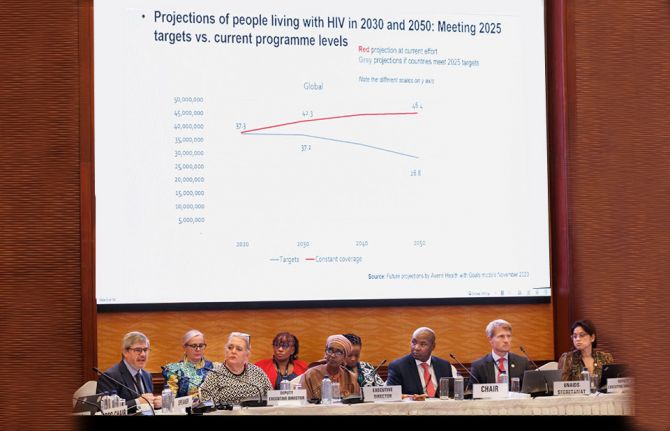 Global leaders commit to accelerating global efforts to end AIDS as a public health threat by 2030
Global leaders commit to accelerating global efforts to end AIDS as a public health threat by 2030

13 December 2024
55th meeting of the UNAIDS Programme Coordinating Board
10 December 2024
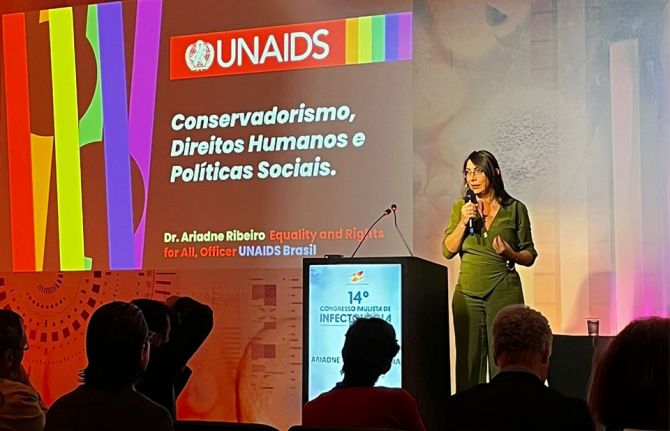 Upholding dignity for everyone: Ariadne Ribeiro Ferreira
Upholding dignity for everyone: Ariadne Ribeiro Ferreira

21 November 2024
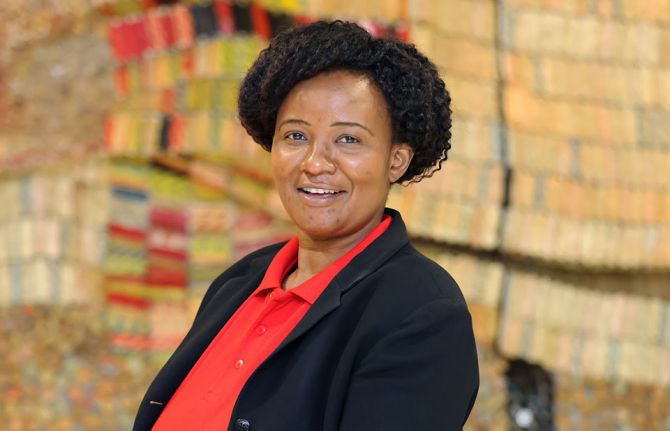 Evelyn Siula: A journey of strength and solidarity
Evelyn Siula: A journey of strength and solidarity
18 November 2024
20th Indian Ocean Colloquium on HIV/AIDS
22 October 2024
Documents
Tackling inequalities, empowering women and girls and leaving no one behind
26 September 2015
Related
29th Ordinary General Assembly of the Organization of African First Ladies for Development
16 February 2025
55th meeting of the UNAIDS Programme Coordinating Board
10 December 2024
20th Indian Ocean Colloquium on HIV/AIDS
22 October 2024
University of Pompeu Fabra
17 October 2024
Linking UN Summit of the Future with COP29
26 September 2024
Revitalized Multilateralism
24 September 2024
Plenary debate of the Summit of the Future
23 September 2024
African Union Year of Education
23 September 2024
Documents
UNAIDS Executive Director's report to PCB-36
03 July 2015
2015 finds us at a true turning point in development—how it is debated and how it is practiced. In September, UN member states are expected to adopt one of the most ambitious agendas in history—the Sustainable Development Goals (SDGs)—which will guide social, economic and environmental action over the next 15 years. The world will begin reaping the benefits of a momentous shift towards society-wide, people-centred approaches to health, climate and social equity.
Related
29th Ordinary General Assembly of the Organization of African First Ladies for Development
16 February 2025
55th meeting of the UNAIDS Programme Coordinating Board
10 December 2024
20th Indian Ocean Colloquium on HIV/AIDS
22 October 2024
University of Pompeu Fabra
17 October 2024
Linking UN Summit of the Future with COP29
26 September 2024
Revitalized Multilateralism
24 September 2024
Plenary debate of the Summit of the Future
23 September 2024
African Union Year of Education
23 September 2024
Documents
Reviewing progress made in the implementation of the Beijing Declaration and Platform for Action (BPFA), 20 years after its adoption at the Fourth World Conference on Women in 1995
20 March 2015
This statement is on behalf of the Secretariat and the cosponsors of the Joint United Nations Programme on HIV/AIDS (UNAIDS). We appreciate the opportunity to discuss how action to address HIV, including through work responding to the Millennium Development Goals, has helped to ‘advance the goals of equality, development and peace for all women everywhere in the interest of all humanity’ as outlined in the Beijing Declaration and Platform for Action and its reviews, and further elaborated in the 1994 ICPD and its subsequent reviews – as well as how this progress can be accelerated and scaled up before the end of the MDGs and in the era of the Sustainable Development Goals.
Related
 From violence to funding cuts, Asia Pacific women living with HIV face old and new challenges
From violence to funding cuts, Asia Pacific women living with HIV face old and new challenges

18 March 2025
 UNAIDS calls for rights, equality and empowerment for all women and girls on International Women’s Day
UNAIDS calls for rights, equality and empowerment for all women and girls on International Women’s Day

06 March 2025
29th Ordinary General Assembly of the Organization of African First Ladies for Development
16 February 2025
55th meeting of the UNAIDS Programme Coordinating Board
10 December 2024
UNAIDS data 2024
02 December 2024
Documents
Executive Director's Report - Down to the details: Fast-Tracking the response to end the AIDS epidemic by 2030
11 December 2014
My friends, we must continue to collectively reflect on how we can become more fit for purpose for the post-2015 transformative agenda—both at UNAIDS and in the United Nations system as a whole. We discussed this at the Chief Executives Board and agreed that a United Nations system that can deliver on the post-2015 agenda must effectively meet the challenges of the twenty-first century. These challenges are diverse and complex and demand the effective coordination of government, civil society, the private sector, academia and others. UNAIDS is uniquely placed to bring together all actors.
Related
 U=U can help end HIV stigma and discrimination. Here’s how
U=U can help end HIV stigma and discrimination. Here’s how

27 February 2025
 How the shift in US funding is threatening both the lives of people affected by HIV and the community groups supporting them
How the shift in US funding is threatening both the lives of people affected by HIV and the community groups supporting them

18 February 2025
Documents
UNAIDS Executive Director's World AIDS Day 2014 message
24 November 2014
Related
29th Ordinary General Assembly of the Organization of African First Ladies for Development
16 February 2025
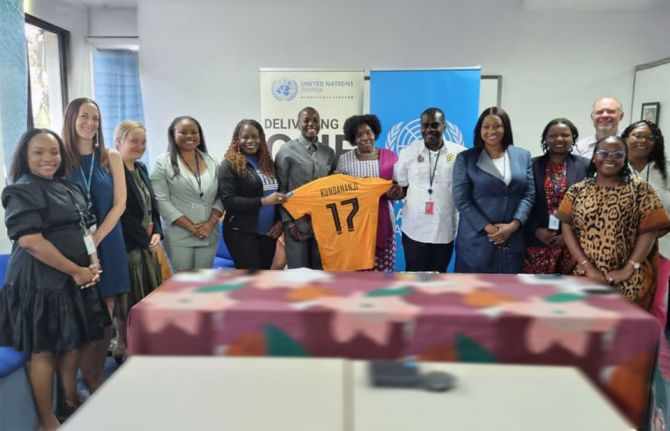 Zambian football star Racheal Kundananji named UNAIDS Goodwill Ambassador for Education Plus in Zambia
Zambian football star Racheal Kundananji named UNAIDS Goodwill Ambassador for Education Plus in Zambia

23 January 2025
Indicators and questions for monitoring progress on the 2021 Political Declaration on HIV and AIDS — Global AIDS Monitoring 2025
17 December 2024
55th meeting of the UNAIDS Programme Coordinating Board
10 December 2024
Documents
90-90-90: A transformative agenda to leave no one behind
25 October 2014
This bold new set of targets, 90-90-90, will do more than reduce new HIV infections and AIDS-related deaths. It will be a transformative agenda for reaching people who are left behind. We have heard from Minister Tien that—with a lot of effort—they have been able to put 38 percent of people in Vietnam who need it on HIV treatment. By 2020, our cascading targets are to have at least 90 percent of all Vietnamese living with HIV know their diagnosis; 90 percent of those people to be receiving antiretroviral treatment; and 90 percent of those on HIV treatment to have an undetectable viral load.
Related
Documents
The last climb: ending AIDS, leaving no one behind
20 July 2014
My friends, let us not leave Melbourne thinking that it will be easy to reach the summit. Complacency will cause us to stumble. Will future generations say that we squandered the opportunity of a lifetime? I know the path will be steep and the obstacles many. Let us do this in memory of our colleagues who died en route to Melbourne and the millions who have died of AIDS-related illnesses and of the tens of millions of people living with HIV. If every person here tonight, and everyone working to end the epidemic, acts with the same sense of urgency, the same hope and the same commitment to fight for those left behind, we will scale this mountain. But only if we go arm in arm will we reach the top and the end.
Related
29th Ordinary General Assembly of the Organization of African First Ladies for Development
16 February 2025
 Zambian football star Racheal Kundananji named UNAIDS Goodwill Ambassador for Education Plus in Zambia
Zambian football star Racheal Kundananji named UNAIDS Goodwill Ambassador for Education Plus in Zambia

23 January 2025
55th meeting of the UNAIDS Programme Coordinating Board
10 December 2024
20th Indian Ocean Colloquium on HIV/AIDS
22 October 2024
University of Pompeu Fabra
17 October 2024
Documents
Speech by Michel Sidibé, Executive Director of UNAIDS on the occasion of New York Forum for Africa, Libreville, Gabon
23 May 2014
Today we can tell the world that soon there will be more African children born with AIDS. There are several countries, including Gabon and Rwanda, where we already have generations born without AIDS. And I believe that this is a small indication of this victory, which of course has resulted in change on several levels. Today we can say that we have not only reduced the price of the drug. We produce one of the best drugs in the world, in South Africa, and no longer for $15,000 per year, but $80 per year per person.
Related
29th Ordinary General Assembly of the Organization of African First Ladies for Development
16 February 2025
55th meeting of the UNAIDS Programme Coordinating Board
10 December 2024
20th Indian Ocean Colloquium on HIV/AIDS
22 October 2024
University of Pompeu Fabra
17 October 2024
Linking UN Summit of the Future with COP29
26 September 2024
Revitalized Multilateralism
24 September 2024
Plenary debate of the Summit of the Future
23 September 2024
African Union Year of Education
23 September 2024
Documents
Opening of the 34th UNAIDS Programme Coordinating Board
03 July 2014
I want to thank the 181 United Nations Member States who submitted global AIDS response progress reports to UNAIDS this year.7 The evidence of progress is bold and inspiring. For example, scaled up efforts to prevent new HIV infections among children are showing remarkable results, with new HIV infections among children continuing to decline. However, we need to ramp up efforts to reach the goals set out in UNAIDS and partners’ Global plan towards the elimination of new HIV infections among children by 2015 and keeping their mothers alive by fully integrating HIV into maternal and child health services.
Related
29th Ordinary General Assembly of the Organization of African First Ladies for Development
16 February 2025
 Global leaders commit to accelerating global efforts to end AIDS as a public health threat by 2030
Global leaders commit to accelerating global efforts to end AIDS as a public health threat by 2030

13 December 2024
55th meeting of the UNAIDS Programme Coordinating Board
10 December 2024
20th Indian Ocean Colloquium on HIV/AIDS
22 October 2024
University of Pompeu Fabra
17 October 2024
Linking UN Summit of the Future with COP29
26 September 2024
Revitalized Multilateralism
24 September 2024

